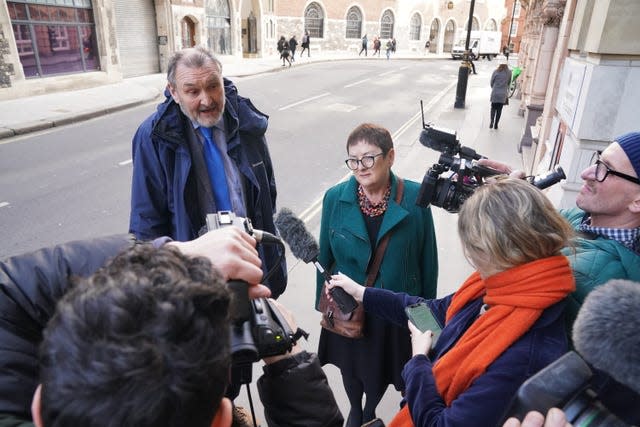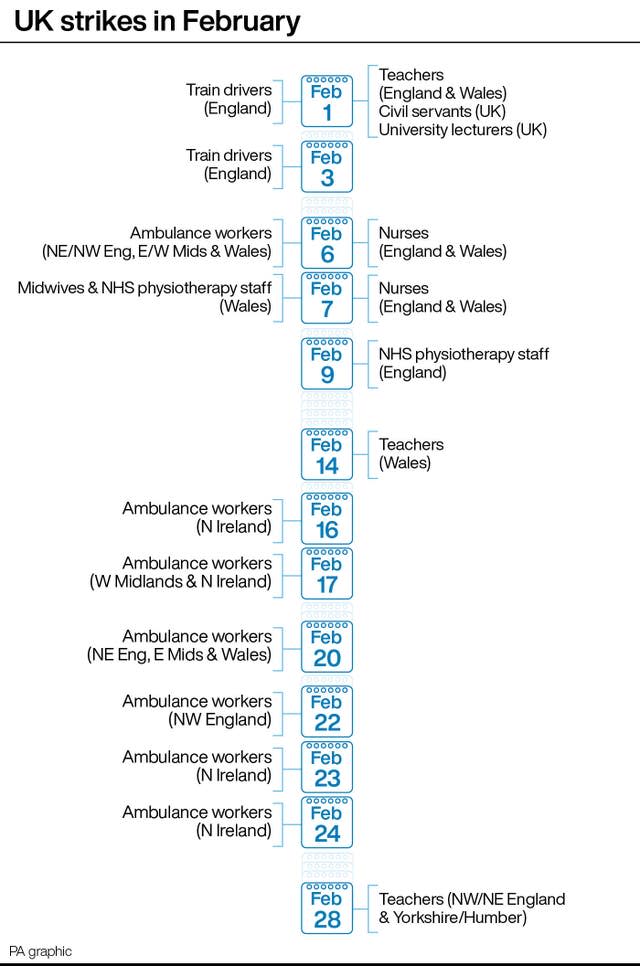Firefighters vote to strike as industrial action spreads
Firefighters have become the latest public sector union to vote for strike action as last-ditch talks failed to avert a walkout on Wednesday by teachers in England and Wales.
Members of the Fire Brigades Union (FBU) backed walkouts by 88% on a turnout of 73% after earlier rejecting a 5% pay offer.
General secretary Matt Wrack said the “overwhelming” vote had delivered a “decisive mandate” for industrial action.
The union said it was giving the Government and employers 10 days to make an improved offer before deciding its next move.

If they go ahead, the strikes will be the first nationwide fire strikes over pay since 2003.
Mr Wrack said: “This is an absolute last resort for our members.
“The responsibility for any disruption to services lies squarely with fire service employers and government ministers.
“The Government and the employers have the power to stop strikes from happening by making a credible offer that can resolve this dispute.
“The ball is in their court.”
Downing Street said the prospect of a walkout by firefighters and control room staff would be “concerning” for the public.
“We will continue to work with that union to see what we can do to mitigate against the possible risks that that poses – and in the first instance call on them to reconsider and keep negotiating,” the Prime Minister’s official spokesman said.
Meanwhile, teachers leaders accused ministers of having “squandered” an opportunity to avert Wednesday’s walkout after talks with Education Secretary Gillian Keegan broke up without agreement.
National Education Union (NEU) joint general secretary Kevin Courtney said ministers had been unwilling to engage seriously with the cause of the action.
Speaking to the PA news agency outside the Department for Education (DfE), he said: “I regret to say that we didn’t hear anything that enables us to say that the strike shouldn’t go ahead on Wednesday.
“There’s no offer from the Secretary of State trying to bridge the gap between us.”
Wednesday’s action is the first of seven days of planned strikes set for February and March which threaten disruption at more than 23,000 schools.

Teachers are joining train drivers, civil servants, university lecturers, bus drivers and security guards from seven trade unions who will walk out in disputes over pay, jobs and conditions.
Ms Keegan said the decision to go ahead was “hugely disappointing” and urged unions to keep head teachers informed of their plans so they can ensure children are kept safe in their classrooms.
“These strikes will have a significant impact on children’s education, especially following the disruption of the past two years, and are creating huge uncertainly for parents,” she said.
“With talks ongoing on a range of issues, including around future pay, workload, behaviour and recruitment and retention, it is clear that strikes are not being used as a last resort.
“I will continue doing everything possible to protect children’s education.”
DfE guidance suggests agency staff and volunteers could be used to cover classes on strike days, with schools expected to remain open where possible.
In a letter sent by Ms Keegan to union general secretaries on Friday, the Education Secretary asked teachers to inform schools if they plan to strike to help avoid “unnecessary disruption”.
The NEU is required by law to provide schools with the number of members that it is calling on to take strike action in each workplace, but the union does not have to provide the names of members.”
Mr Courtney said that while Wednesday’s walkout will go ahead, there was still time for ministers to avoid further strike days.
“There was just a hint at the end of the discussions today that they might come back with something that was more like an offer,” he said.
“So we’re hoping for further meetings, and we’re hoping for serious engagement because the issues we’re raising with them are very pertinent and very real.”

 Yahoo Movies
Yahoo Movies 